

The Christkindlmarkt at Marienplatz is a Christmas market at Marienplatz in Munich.


The Christkindlmarkt at Marienplatz is a Christmas market at Marienplatz in Munich.
The largest and oldest Christmas market in Munich was first documented as a Nikolaimarkt (Nikolausmarkt) in 1310, making it one of the oldest Christmas markets in the German-speaking world. In 1806, the Nikolaimarkt was renamed the Christmarkt. Since 1972, the market has found its place of business on the Marienplatz after several changes of location. Over the last few years, the exhibition area has been extended considerably (e.g. Rindermarkt). The organizer is the cultural office of the city administration.

With around 140 market stands, it now has around three million visitors every year from all over the world. In addition to the extensive musical-cultural accompanying program, the almost 30-meter-high Christmas tree in front of the town hall, with around 2,500 lights, is donated every year to the citizens of Munich by a different town from Austria or Italy. As a reward for the gift, the municipality can present itself in the inner courtyard of the town hall and operate a Glühwein stand. The high interest of non-municipal communities for this in this self-presentation position, forced the organizers to create a multi-faceted waiting list. [1] The market is usually open daily from the Friday before the first Advent Sunday, until Christmas Eve.
To the west of the Marienplatz, in the direction of Stachus, is the so-called Kripperlmarkt. More than ten stands around the Richard Strauss fountain in the Neuhauserstraße offer only Nativity scenes, figures, and other accessories. There are also some market stands offering food and drinks. The Kripperlmarkt in the Munich pedestrian zone is open daily and also closes on 24 December (Christmas Eve) at 2 pm.

Munich is the capital and most populous city of the Free State of Bavaria. With a population of 1,578,132 inhabitants as of 31 May 2022, it is the third-largest city in Germany, after Berlin and Hamburg, and thus the largest which does not constitute its own state, as well as the 11th-largest city in the European Union. The city's metropolitan region is home to about six million people and the third biggest metropolitan region by GDP in the European Union.

Dortmund is the third-largest city in North Rhine-Westphalia, after Cologne and Düsseldorf, and the ninth-largest city in Germany. With a population of 609,000 inhabitants, it is the largest city of the Ruhr as well as the largest city of Westphalia. It lies on the Emscher and Ruhr rivers in the Rhine-Ruhr Metropolitan Region and is considered the administrative, commercial, and cultural centre of the eastern Ruhr. Dortmund is the second-largest city in the Low German dialect area, after Hamburg.

Einbeck is a town in the district Northeim, in southern Lower Saxony, Germany, on the German Timber-Frame Road.
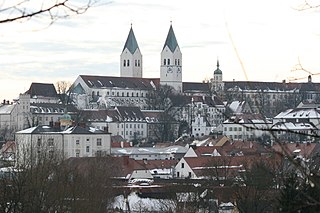
Freising is a university town in Bavaria, Germany, and the capital of the Freising district (Landkreis) with a population of about 50,000.

The Striezelmarkt in Dresden is one of the first genuine Christmas markets in the world. Founded as a one-day market in 1434, it celebrated its 585th anniversary in 2019. Its 240 stands attract about 3 million visitors from all over the world. The annual market lasts throughout the Advent season until Christmas Eve.

A Christmas market is a street market associated with the celebration of Christmas during the four weeks of Advent. These markets originated in Germany, but are now held in many countries. Some in the U.S. have adapted the name to the quasi-German Christkindlmarket, substituting market for German Markt.

Ebersberg is the seat of the similarly named Ebersberg Landkreis (district) in the Oberbayern Regierungsbezirk in Bavaria, southern Germany. The Ebersberger Forst (forest) is one of Germany’s largest continuous area of woodlands.

Vaterstetten is a municipality in the Upper Bavarian district of Ebersberg. It lies east of Munich and is the district's biggest community. Vaterstetten is on the outskirts of Munich, roughly twenty minutes by S-Bahn from Marienplatz.

Marienplatz is a central square in the city centre of Munich, Germany. It has been the city's main square since 1158.
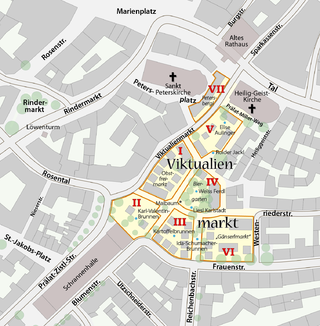
The Viktualienmarkt is a daily food market and a square in the center of Munich, Germany. It has been held daily since 1807, except on Sundays and public holidays.

Markt Schwaben is a town in Bavaria, Germany. It lies roughly 23 km east of Munich on the northern edge of the Upper Bavarian district of Ebersberg. Neighbouring communities are Anzing, Forstinning, Pliening and Poing, as well as Finsing, Ottenhofen and Pastetten.

Munich-Pasing is a railway station in the west of Munich. It is the third-largest station in the city, after München Hauptbahnhof and München Ost.

The New Town Hall is a town hall forms the northern part of Marienplatz in Munich, Bavaria, Germany. It hosts the city government including the city council, offices of the mayors and a small portion of the administration. In 1874 the municipality had left the Old Town Hall for its new domicile.

Tallinn Christmas Market is a Christmas market held every year in Tallinn, Estonia. The modern market was founded in 2001 by Paul Oberschneider, and is open from Christmas Day until Epiphany. The latter also marks the end of the Christmas season according to the Gregorian calendar. The market brings tourists from all over the world to Tallinn.
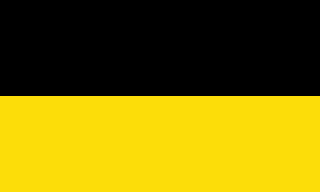
The following outline is provided as an overview of and topical guide to Munich:

The Rindermarkt is one of the oldest streets in Munich, which connects to the Marienplatz in the north through the former Inner Sendlinger Tor. Its continuation today forms the Sendlinger Straße, which leads to the (outer) Sendlinger Tor.
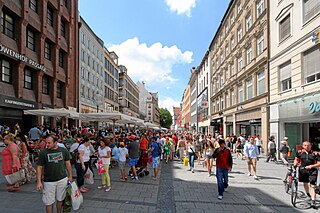
The Kaufingerstraße is one of the oldest streets in Munich and, together with the Neuhauser Straße, one of the most important shopping streets in Munich.
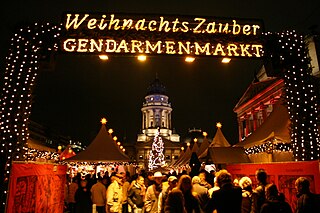
There are over 80 Christmas markets in various parts of Berlin, where craftspeople demonstrate their skills and sell their wares along with many other Christmas gifts and fairground attractions. The first Christmas market took place in 1530 in Alt-Berlin.

The Leipzig Christmas Market is one of the oldest Christmas markets in Germany. It takes place annually from the end of November to 23 December on Leipzig's market square and the adjacent streets and, with around 300 stalls and over 2.8 million visitors (2019), is one of the largest Christmas markets in Germany.